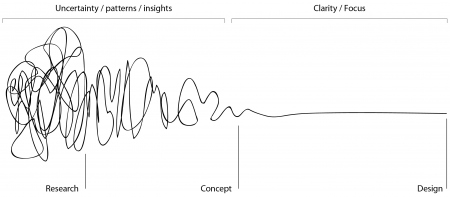The only time that comparing actual products makes sense is when you are buying something that is essentially pre-fabricated, like a subway sandwich where they ask a few questions about what you want and drop a few swappable pieces into a pre-prepared formula.
If this is your business model - if you bash out a lot of very similar designs quickly for people happy with something that isn't a great fit but does just about work - then spec work and mockups make sense. But this is the only time that they make sense.
If people want serious design work that really fits their need they need to understand how the design process works. Here's a classic diagram by Damien Newman:

If you're doing spec work, you would be going all the way through the squiggle and half way through the straight line before you even know you're doing the work: rushing through all the hard stuff and leaving only the final polishing. That's not just bad for you: you'll be cutting out so much of the important squiggle at the start that it's more or less impossible that you produce something that matches the client's need more than superficially.
Realistically, you're going to be recycling more or less the same concept as last time, with a few tweaks that are the equivelent of swapping tomato and mayo for peppers and chilli on a meatball sandwich.
The work will be average, but plenty of designers do make a reasonable living like this. There are plenty of worse ways to make a living.
For something genuinely good, however, that genuinely meets the need, it's never going to work. The majority of the work, time and skill comes in before the concept line: really understanding the context, and developing, testing and improving ideas based on a deep understanding of the client's actual need.
There are plenty of clients who are happy with average but professional-looking work that sort of fits their need even though really it was designed for someone else. There are plenty of middle-of-the-road designers who are happy to churn this stuff out. If that's not you, and if you think that's not really what they want, you have to make them understand how it works.
If someone asks you for a free knockup, you have to make them understand that they are asking you to essentially cut out or minimise the part of the process that has the biggest impact on the quality, effectiveness and relevance of the final result.
